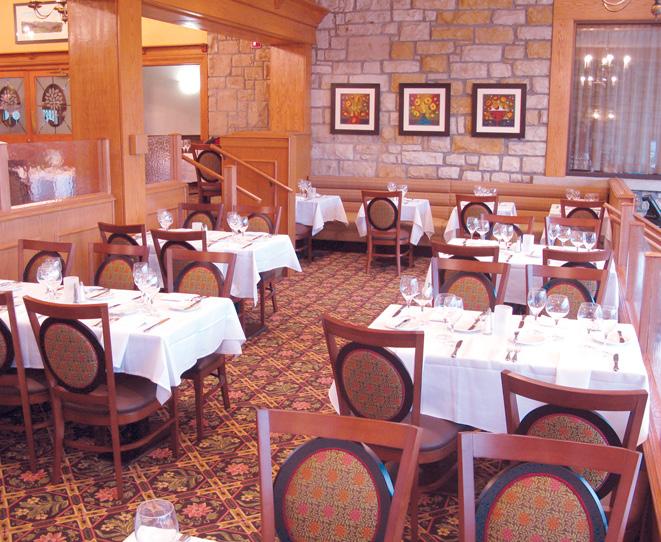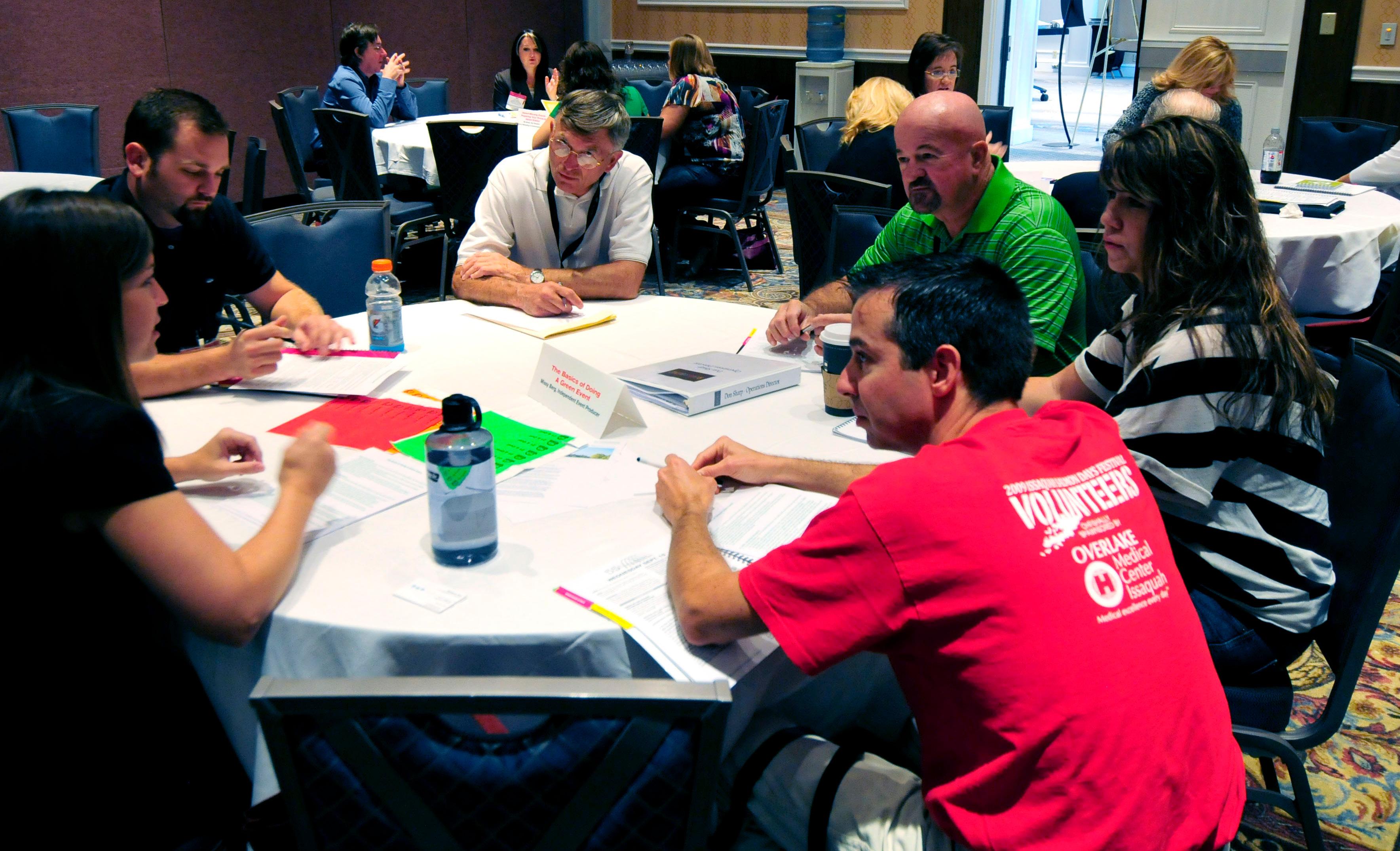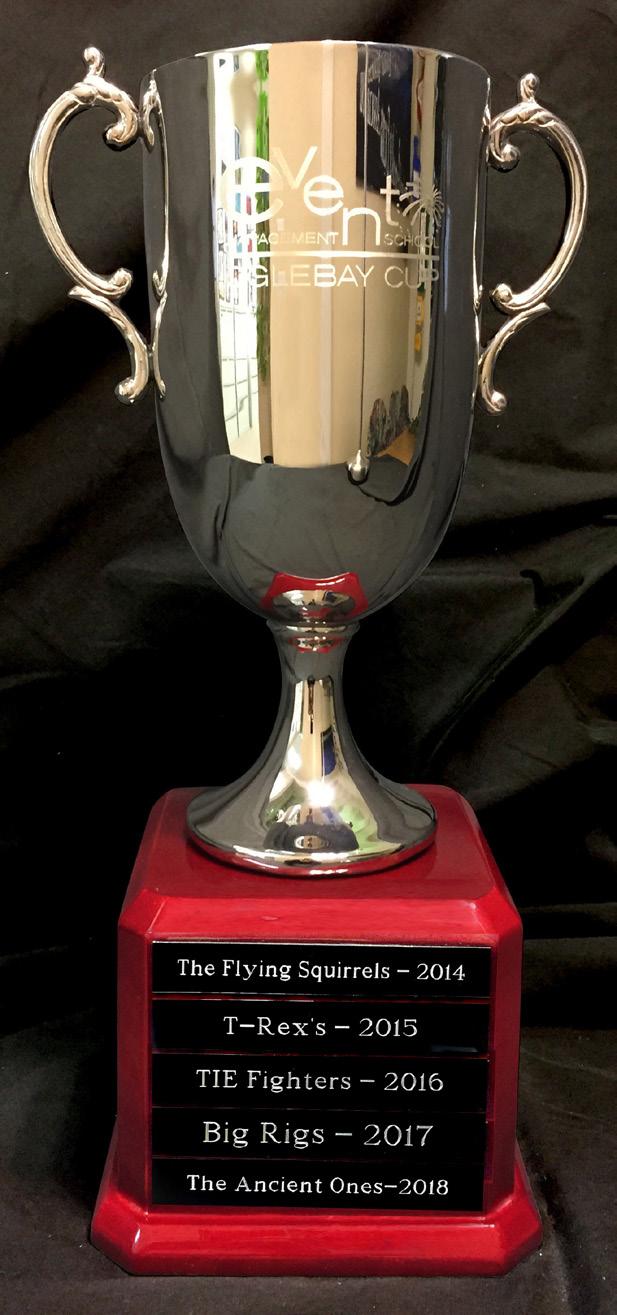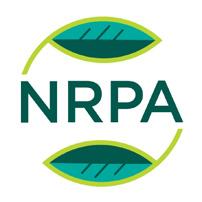








Quality festivals and events are among the most successful tools available to communities, states, regions, and even countries to increase tourism, create powerful and memorable branding and imaging opportunities, bond people together, encourage positive media coverage, enhance economic impact, and add to the quality of lives for those who live there. On the other hand, a poorly planned, managed and executed event can have a reciprocally opposite effect.
Over time, events themselves have changed; from often informal affairs to spectacular productions, requiring new sets of skills, experience, creativity, financing, planning and leadership. As a result, event management has evolved into a business and an industry, with new demands, challenges and expectations every day; from attendees / participants; sponsors; host communities and a plethora of other partners that the success of any event depends on.
Presented by two of the most respected professional associations in our industry – the International Festivals & Events Association (IFEA) and the National Recreation and Park Association (NRPA) – the Event Management School at Oglebay National Training Center in West Virginia was designed around the concept of bringing new and mid-career industry professionals together with some of the most highly-respected and experienced professionals in the field, for a comprehensive educational and networking opportunity that will cover the critical basics of successful event management and then put students in an applied-knowledge project environment to test and further what they have learned.
“No other investment is more important for the board of a festival or special event than to assure that their staff is growing in their professional development. The Event Management School at Oglebay provides our industry with one place for new and mid-management level professionals to receive intensive, comprehensive training in the core competencies of event management, conducted by many top professionals in the field. It is the equivalent of a full-brain download for those who want to have a well-rounded, working understanding of our profession.”
Bruce L. Erley, CFEE, APR President & CEO
Creative Strategies Group



“If you were applying to my organization for a job - and I knew that you had completed the IFEA / NRPA Event Management School program – your resume would rise to the top of the pile.”
Curt Mosel, CFEE, Chief Operating Officer ArtsQuest

The Event Management School is designed as a two-year continuing education program. Students live on-site at the Oglebay Resort and National Training Center with their professional peers and instructors during the one-week institute each year, adding a unique one-on-one networking opportunity for everyone. Year One Students at the Event Management School follow an intensive, interactive, classroom pathway through 24 hours of topical training, from a clear definition of event management as a profession through to the final and important evaluation phase of an event. Year Two Students take it up a notch in applied workshop settings and a unique hands-on, deadline-driven, event concept design, team project experience that combines many critical event management skills, that can be transferred to multiple, real-life scenarios. Event-expert team advisors help to guide event teams through a week of market research, concept creation/design, budgeting reality checks, human resource challenges, and presentation stages of an all-new event concept, for a specially selected city, with a
limited-use “Client” contact. Teams will present their completed plans/concepts to a panel of industry leaders and fellow students on the last day, who will offer critiques, insights and accolades. Plans/Concepts approved by the expert panel will be shared with the selected city for consideration in their market.
The Event Management School will bestow an Event Management School Diploma to those successfully completing both years of this intensive continuing education program. For those needing CEU credits, the NRPA will provide 2.0 CEU’s for each completed year. Additionally, for those desiring to ‘raise the bar’ by registering for the IFEA’s professional certification program (separate registration required), successful completion of the twoyear Event Management School will earn you designation as a ‘Certified Festival & Event Associate’ (CFEA), the first phase toward future attainment of your ‘Certified Festival & Event Executive’ (CFEE) designation, which recognizes an industry-focused combination of
top-level experience and continued education. Additionally, all students enrolled in the program will receive one full year’s access to the IFEA’s professional education on-line Webinar series (a $1000 value). (Live Webinar presentations only.)
• Current mid-management event staff looking to broaden their knowledge base while enhancing their professional networks.
• Parks and Recreation managers and staff who produce and/or work with local events.
• Those new to the Event Management field.
• Event Management students looking to strengthen their professional resumes.
• Key event volunteers looking to expand their capabilities.
Event Management School instructors are selected by the International Festivals & Events Association (IFEA) from among the top event management professionals in our industry today.
The Event Management School first-year curriculum was created with the goal of providing a strong basic understanding and awareness of the multiple, critical components involved in event planning and management. The second-year curriculum builds upon that first-year knowledge-base by providing more applied workshop-styled opportunities in specific areas, together with a project-based opportunity to help bring the ‘real world’ a little closer to the classroom.
NOTE: The Event Management School curriculum is not targeted at the corporate meeting-planning niche of our industry, but rather the outdoor public event sector.
“The Event Management School at Oglebay has created a vital tool in developing festival and event industry professionals. As any event producer can attest, training new staff often amounts to a “sink or swim” option. To have a venue where personnel can learn, interact and network with industry leaders, instructors, and peers from other events and markets increases professionalism and output multiple-fold.”
Ted Baroody, CFEE, President, Norfolk Festevents


Strong Foundations: Understanding Event Management and the Importance/Impact of Quality Events
The success and sustainability of an event is ultimately built upon the foundations that have been laid long before the public ever experiences it. Behind that success you will find a well-developed pattern of planning and processes, passionate leadership, a dedication to creativity and quality, a commitment to inclusiveness, and the ability to operate as a professional business that clearly understands their product, target market, industry and challenges. You will also find a global industry that has evolved over time into the field that you are/hope to be a part of today; one whose impact touches lives around the world and keeps our communities, cities and world bonded together. This session will explore the ‘why’ of why we are all here; provide a broad overview of this unique and special field; and lay the foundation for the training to follow in the week ahead.
A successful event doesn’t start with the fireworks finale. Behind every exciting, funfilled event is a well-run business, complete with paperwork, planning meetings, legal obligations to be met, and partnerships to be built. Reputations are often based far-
more upon the business side of your event than on who your headline entertainers are. We’ll teach you what you need to be thinking about.
Arriving at the Bottom-Line: Event Budgeting and Budget Management
Every time there’s a good idea, someone brings up the budget! A realistic and informed budget can set the stage for a less stressful and more profitable event. We’ll teach you how to create and use a budget to guide your success.
Putting the ‘Community’ in ‘Community Events’: Building a Successful Volunteer Program
Volunteers put the ‘community’ in ‘community events’ and some events have legions of dedicated workers who bring valued skills to the table while holding costs to a minimum. This session will cover critical components of a successful volunteer program, including recruiting, training, management, communications, retention and rewards.
Event Administration & Legal Considerations
Really? I have to think about that? Despite being a ‘fun’ industry, there are lots of behind-the-scenes ‘t’s’ to be crossed and ‘i’s’ to be dotted; obligations to be met; risks to be
avoided/protected against; staffs and boards to be managed and supported; services to be secured and contracts to be signed. We’ll do our best to help you understand them.
Operations: From Vision to Reality
The expansive area of ‘Operations’ is where the rubber meets the road and this session will cover multiple areas that can make or break an event.
• Event Infrastructure: The infrastructure for many events is a lot like building a small village where the day before there was nothing. Stage, lights, sound, tents, vehicles, decorations, bleachers, food delivery, trash pick-up, communications, utilities, parking, et al., we’ll talk about what you may need, where to go get it, and lots of insider-tips to remember in the process.
• Attendee & Support Services: Whenever you plan to draw a crowd, you’ve got to be thinking about what their needs may be: information, medical, lost kids, rest areas, ATM’s, restrooms, trash disposal, signage, communications, safety and security plans; accessibility; and much more. We’ll make sure you don’t forget anything.
• Programming, Site-Design and Event Flow: When did having fun require so much thinking? Like a theme park, effectively planning your event programming, site layout, service accessibility, etc., can
NOTE: All sessions are subject to change.

ations that will keep your event flowing smoothly.
• Environmental Realities: Events can play an important role through education and as a role model in protecting the environment. We’ll touch on some of the ‘Green Reality’ options that events can consider today.
There are very few events today that can operate without sponsorship support, but successful sponsorship doesn’t just happen. This session will cover the basics of sponsorship and successful sponsorship sales, including why sponsors sponsor and how to identify and create a valuable menu of sponsorship benefits/assets for your event. Students will also learn about the valuable world of mobile marketing. And we’ll cover the critical role of sponsor service; the key to renewing and keeping those all-important sponsor partners we all depend on.
Marketing & Mediums: Traditional, Social and Creative
All the planning in the world won’t make for a successful event unless it is properly marketed. This session will talk about how to develop an effective marketing plan and considerations for working with traditional media (television, newspaper and radio… yes, they are still around and still important) as well as today’s newest technology options.
NOTE:
tion deal with sponsorship, the major portion of revenue generated by many event organizations comes from more traditional sources – items such as food and beverage, merchandise and ticketing. This area of instruction is designed to look at such items and other components of important nonsponsorship revenue sources, including financial transactions, touchless transactions, and the constantly changing expectations of those attending our events.
Risk management is a central part of any event organizing committee’s planning cycle – it’s both an operational and “duty of care” requirement. What is it? It is a process whereby the event planning team methodically addresses the risks associated with their activities, with the goal of treating or mitigating those risks which may have an adverse impact (financial, image, reputation, etc.) on the event if the risk is materialized. We’ll make sure you are focusing om the critical considerations.
Social Media Marketing: Understanding the Landscape, Benefits and Challenges
It’s a new and quickly changing world, with Facebook, X, LinkedIn, Instagram, TikTok, blogs and many, many more. How do you decide which ones are important and use them as an effective part of your event marketing mix? This session will provide a more in-depth look at maximizing new technologies (including AI) and opportunities.
to all interested parties, we must learn to see ourselves as a singular team of partners working toward common goals. Key among those partnerships is the one between events and cities. This session will talk about what a successful partnership looks and feels like when it works.
Is Everyone Invited? Including Those with Disabilities
Producers at events around the world are concerned about how they can comply with their country’s disability rights laws and how they can best serve their patrons with disabilities. This fast-paced session provides practical information and a format for designing a comprehensive Access Program for your festival/event. We will discuss important but often forgotten aspects of a wellmanaged Access Program. Help to avoid litigation by being prepared.
How’d You Do? Surveys, Evaluations and Economic Impact Studies
No event is complete until the last survey and evaluation is in. This is the first step in all future events and this session will teach you how to do it effectively and cost-effectively.
Year-Two Team City Event Presentations
Year-One Event Management School students will participate in the City Event Concept Project reports by second year student teams, asking questions, and serving in the shared role of ‘People’s Choice’ Judge.
The Application of Project Management to Events
Events are the end result of countless details, processes, and tasks, all coming successfully together; but how do you manage all of those priorities and make sure nothing falls between the cracks? Project Management is an accountable management method using tools and techniques honed over 50 years of use around the world by governments, corporations, and selected events. This session will set the stage for coordinating everything else that follows and provide an important tool for all those attending.
Customer Focused Events – Planning to Meet the Needs of Your Stakeholders
Most events are typically designed from the event producer’s viewpoint, which contrasts sharply with an event’s intended outcomes. This hands-on session introduces The Event Canvas ™ concept, empowering you to envision your events from a fresh and stimulating perspective, which will meet and exceed your stakeholders’ expectations.
Applied Risk Management
The tragedy of event realities that include shootings; vehicular incidents; crowd panic and crushes; bombings; stage collapses; airshow crashes; gang-related violence; drugrelated deaths; human trafficking; and a plethora of more generic incidents like tripand-fall accidents; golf carts; vendor safety; et al., at events and in cities of all sizes, serve as stark reminders of the need to plan and prepare for all of the many incidents / possibilities that can / may affect our events on a moment’s notice. This important session will address what keeps us up at night and the steps that we can realistically take to address and respond to those concerns through contingency planning and preparation, as well as on-site during an event.
Inside Perspective: What Cities Want from Events and the New Age of Partnership in Municipal Event Management
The relationship between cities and events has been evolving (sometimes devolving) for many years. Whether you are creating a new event or continuing to build upon a long-existing one, you must first start from a level of understanding about what cities want from events. Combining your goals with theirs, you can build a lasting and powerful partnership that will provide exponential benefits for everyone. This session will define some of those key goals and how to achieve them.
AI and Its Impact on Events
In a relatively short span of time, AI has changed the course of most every industry, creating both new challenges and new opportunities, as we look to the future. This important course will cover the litany of possibilities to maximize your use of AI, and in turn, your event and staff.
Following our introductory course in Year One, this important session will focus more closely on how to produce a well-run Access Program. We will look at how to build a first-rate Access Team, work on creating the Access Program for your EMS City Project event and get specific about how to manage your accessible viewing platforms and areas. Come away better prepared to create a strong Access Program.
Taking the art of sponsorship to the next level, even before you start selling your event, this session will instruct students on how to conduct sponsor research, where to look, what to look for and how to use what you find. Following on that preparation we’ll cover what makes for a successful sponsorship proposal and, equally important, the follow-up reports that will keep them coming back.
Working from a draft event program plan, and other desired ‘bells and whistles’ that impact the event ‘experience’, students will learn how to develop an event budget, discussing what to include, how/where to research, fair and realistic estimates, the keeping of formula and assumption notes/records, use of a budget in managing an event throughout the planning and production process, budget reports, tracking expectations and more.
The City Event Concept Project will provide a substantial hands-on experience with an event focus. Event expert team advisors will help to guide event teams through a week of market research, concept creation/design, budget reality checks, and presentation stages of an all-new event concept(s) for an actual city/market (including limited use “Client” contact). Teams will present their completed plans/concepts to a panel of industry leaders and fellow students on the last day, who will offer critiques, insights and accolades. Final plans/concepts deemed the most feasible will
be offered to the selected city contacts for consideration in their own internal creative process and the winning team will be recognized for pride and posterity on the Event Management School ‘Oglebay Cup’ trophy. During the week, each team (assigned randomly to reinforce the reality of an event environment) will participate in the following project steps:
• Research and Development of Creative and Innovative Event Concepts to Serve Market Needs, Challenges & Opportunities; Audiences; Event Calendar; Organizational Mission; Available Venues; and Unique Capabilities
• Research & Development of an Event Programming / Management / Operational Plan and Expense Budget to Meet Defined Goals
• Research and Development of an Event Income Budget with Suggested and Realistic Sources, plus Sales Strategies, to Meet Defined Goals
• Professionally Delivered City Event Concept Presentations (all team members must play a role in the final presentation) in the format of an outside consulting firm presenting concepts to a client
Teams will be assessed on Teamwork, Event Proposal / Plan and Presentation.

JANUARY 12-17, 2025
Name (as you wish it to appear on your badge):



EMAIL, MAIL OR FAX THIS FORM TO: The National Training Center for Public Facility Managers at Oglebay Resort & Conference Center 465 Lodge Drive, Wheeling, West Virginia 26003 Phone: (304) 243-4126 • Fax: (304) 243-4106
E-mail: ntc@oglebay-resort.com
Date:
Date: For any special needs or accommodations, please contact Oglebay at (304) 243-4126.
Please visit our website at www.oglebay-resort.com for Room descriptions.
METHOD OF PAYMENT: A check, purchase order or credit card for the full package amount must accompany this form in order to complete enrollment. When paying with a credit card, the package amount will be charged to your card upon receipt of registration. You will receive confirmation from Oglebay Wilson Lodge.
NOTE: The balance must be paid prior to arrival.
Check (make check payable to Wheeling
POLICY: A cancellation fee of $100 will be charged for cancellation at any time up to 30 days prior to the school; 30 to 7 days prior, 50% will be charged; and with 7 days or less notice, no refund will be issued.
FOR MORE INFORMATION:
www.NRPA.org 800.626.NRPA (6772) 7-1-1 for speech and hearing impaired